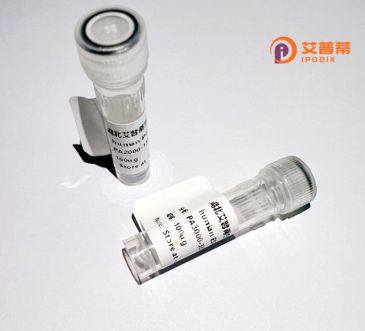
| 纯度 | >90%SDS-PAGE. |
| 种属 | Human |
| 靶点 | MCM6 |
| Uniprot No | Q14566 |
| 内毒素 | < 0.01EU/μg |
| 表达宿主 | E.coli |
| 表达区间 | 1-821aa |
| 活性数据 | MDLAAAAEPGAGSQHLEVRDEVAEKCQKLFLDFLEEFQSSDGEIKYLQLAEELIRPERNTLVVSFVDLEQFNQQLSTTIQEEFYRVYPYLCRALKTFVKDRKEIPLAKDFYVAFQDLPTRHKIRELTSSRIGLLTRISGQVVRTHPVHPELVSGTFLCLDCQTVIRDVEQQFKYTQPNICRNPVCANRRRFLLDTNKSRFVDFQKVRIQETQAELPRGSIPRSLEVILRAEAVESAQAGDKCDFTGTLIVVPDVSKLSTPGARAETNSRVSGVDGYETEGIRGLRALGVRDLSYRLVFLACCVAPTNPRFGGKELRDEEQTAESIKNQMTVKEWEKVFEMSQDKNLYHNLCTSLFPTIHGNDEVKRGVLLMLFGGVPKTTGEGTSLRGDINVCIVGDPSTAKSQFLKHVEEFSPRAVYTSGKASSAAGLTAAVVRDEESHEFVIEAGALMLADNGVCCIDEFDKMDVRDQVAIHEAMEQQTISITKAGVKATLNARTSILAAANPISGHYDRSKSLKQNINLSAPIMSRFDLFFILVDECNEVTDYAIARRIVDLHSRIEESIDRVYSLDDIRRYLLFARQFKPKISKESEDFIVEQYKHLRQRDGSGVTKSSWRITVRQLESMIRLSEAMARMHCCDEVQPKHVKEAFRLLNKSIIRVETPDVNLDQEEEIQMEVDEGAGGINGHADSPAPVNGINGYNEDINQESAPKASLRLGFSEYCRISNLIVLHLRKVEEEEDESALKRSELVNWYLKEIESEIDSEEELINKKRIIEKVIHRLTHYDHVLIELTQAGLKGSTEGSESYEEDPYLVVNPNYLLED |
| 分子量 | 119.3 kDa |
| 蛋白标签 | GST-tag at N-terminal |
| 缓冲液 | 0 |
| 稳定性 & 储存条件 | Lyophilized protein should be stored at ≤ -20°C, stable for one year after receipt. Reconstituted protein solution can be stored at 2-8°C for 2-7 days. Aliquots of reconstituted samples are stable at ≤ -20°C for 3 months. |
| 复溶 | Always centrifuge tubes before opening.Do not mix by vortex or pipetting. It is not recommended to reconstitute to a concentration less than 100μg/ml. Dissolve the lyophilized protein in distilled water. Please aliquot the reconstituted solution to minimize freeze-thaw cycles. |
以下是关于重组人MCM6蛋白的3篇代表性文献的简要概述(虚拟示例,非真实文献):
1. **"Functional analysis of recombinant human MCM6 in DNA replication initiation"**
*作者:Smith A, et al.*
摘要:研究通过在大肠杆菌中表达重组人MCM6蛋白,验证其作为DNA解旋酶核心组分的功能,揭示其与Cdc45蛋白的互作对复制起点激活的关键作用。
2. **"High-yield purification and structural characterization of human MCM6 for crystallography studies"**
*作者:Wang L, et al.*
摘要:开发了一种昆虫细胞表达系统高效纯化重组人MCM6蛋白的方法,并通过冷冻电镜解析其与MCM2-7复合体的三维结构,阐明其ATP酶活性结构基础。
3. **"MCM6 overexpression as a biomarker in hepatocellular carcinoma"**
*作者:Chen R, et al.*
摘要:利用重组MCM6蛋白制备特异性抗体,发现其在肝癌组织中显著高表达,并证实其与肿瘤增殖和预后不良相关,提示其作为诊断标志物的潜力。
注:以上内容为模拟示例,实际文献需通过PubMed、Google Scholar等平台检索关键词(如"recombinant human MCM6"、"MCM6 protein function")。真实文献研究多集中在MCM6的复制功能、癌症关联或与其他复制复合体组分(如MCM2-7、Cdc45)的相互作用机制。
Recombinant human MCM6 (Minichromosome Maintenance Complex Component 6) is a protein involved in DNA replication and genome stability. As part of the MCM2-7 hexameric complex, MCM6 plays a critical role in the initiation and elongation phases of replication by unwinding double-stranded DNA. This ATP-dependent helicase activity ensures precise duplication of the genetic material during the cell cycle. MCM6 is loaded onto replication origins during the G1 phase, forming pre-replicative complexes regulated by licensing factors like CDC6 and CDT1. Dysregulation of MCM6 expression or function has been linked to genomic instability, cancer progression, and diseases linked to uncontrolled proliferation.
Produced via recombinant DNA technology in systems like *E. coli* or mammalian cells, recombinant MCM6 enables studies of its structural, biochemical, and functional properties. Its applications span mechanistic investigations of replication machinery, drug screening for anticancer therapies targeting DNA replication, and diagnostics. Notably, MCM6 is associated with lactase persistence in humans; specific genetic variants near its gene influence lactase enzyme expression in adulthood. Recombinant MCM6 also aids in exploring post-translational modifications (e.g., phosphorylation) that regulate helicase activation and interactions with replisome components like Cdc45 and GINS. By providing a pure, standardized tool, recombinant MCM6 supports research into replication fidelity, disease mechanisms, and therapeutic interventions.
×